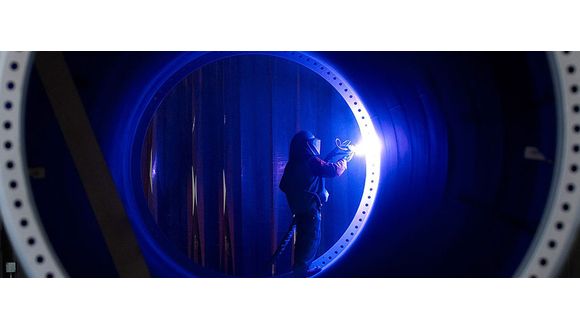Tue, 25 August, 2020
Thermal sprayed aluminium (TSA) coatings are widely specified for the protection of steels from corrosion in seawater environments e.g. offshore structures, risers, pipe components, bridges and ship structures. The main service conditions for the application of TSA include seawater immersion, tidal and splash zones, and marine atmospheres.
Toughness, low maintenance requirements, and long-term service life are among the desirable properties offered by TSA coatings. These characteristics are achieved through barrier action, combined with good adhesion and an ability to provide cathodic protection to exposed steel. A 200µm thickness TSA coating can provide a service life in excess of 30 years in a splash zone environment, if optimised. Key factors for optimisation include TSA alloy composition; surface preparation; choice and application of a sealer; service application; electrochemical/galvanic exposure conditions; coating application techniques and process parameters.
The stringent requirement of the offshore industries (e.g. oil and gas) to have a maintenance free coating system, with an expectation of up to 50 years life in severe environments, has increased interest in TSA coatings as a viable economic alternative to paint based systems. Although it has been demonstrated that TSA deposited by conventional spray systems can work well over extended periods, incidents of premature coating failure due to blistering and detachment have been recorded, indicating that coating quality and coating application procedure is extremely important. Porosity, oxide content and non-uniformity in the TSA coatings produced by conventional systems are believed to result in reduced corrosion protection and shorter lifetime.
Recent developments in spraying equipment via modification in nozzle and gun design, and process parameters (such as higher gas flow rates and gas pressures) can produce superior TSA coatings with improved properties.
Alloy grades typically used in this process are 1100 or 1350, which are 99% and 99.5% pure aluminium respectively. Wires should conform to ISO 209-1, AWS C2.25/C2.25M or ASTM B 833, and are usually applied via a “twin-arc” nozzle system. Resultant coatings can operate within a temperature range of -45C to +540C.
TWI has facilities and expertise in this technology that are second to none, spanning disciplines from spraying methods and metallurgy, through to corrosion testing and structural health monitoring. We are proud to support TWI Industrial Members in this field, on both sides of the producer / end user interface.
